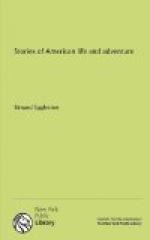The bear did not like smoke. After a while he crawled out of the hole to get breath. Scouwa shot him.
He hung the bear meat out of the reach of wolves, and carried back to the hut all that he could take at one time. The old man and the boy were greatly pleased when they heard that there was bear meat as well as buffalo meat in plenty. After this they had food enough.
SCOUWA BECOMES A WHITE MAN AGAIN.
The next year after this hard winter in the woods, the Indians that Scouwa lived with went down the River St. Lawrence to Canada. At this time Canada belonged to the French. The French were at war with the English, to whom Pennsylvania belonged. The Indians were on the side of the French.
Scouwa heard that there were prisoners from his country who were to be sent back in exchange for French prisoners. He slipped away from the Indians, and went to Montreal. Here he put himself among the other prisoners.
After a while the prisoners were sent back to their own country. Scouwa came to his own family again. They did not know that he was alive. He put on white man’s clothes. He let his hair grow like a white man’s. He spoke English once more. He was no longer called Scouwa, but James Smith. But still he walked like an Indian. All his movements were those of an Indian. He had lived nearly six years among the savages.
He afterward became a colonel among the white men. He moved to Kentucky, and fought against the Indians. But he made his men dress and fight as the red men did. He thought it was the best way of fighting in the woods.
A BABY LOST IN THE WOODS.
When people first began to move across the Alleghany Mountains, there were no roads for wagons; but there were narrow paths called trails. Families traveled to the west, carrying their goods on horseback along these trails. Here is a story that will show you how they traveled.
Among those who went from Virginia to Kentucky, in 1781, was a man named Benjamin Craig, who took his whole family with him. Mr. Craig wore a hunting shirt and leggings of buckskin and a fur cap. Like all men in the backwoods, he carried a hatchet and a knife stuck in his belt, and he almost always had his old-fashioned flintlock rifle on his right shoulder. A horn to hold powder was worn under his left arm, and supported by a string over his right shoulder. He had a little buckskin bag of bullets fastened to his belt. At the head of the party, he traveled over the mountains on foot, walking before his horses.
The horses came one after another. On the first horse rode Mrs. Craig. She carried her baby in her arms. Tied on the back of the horse were a pot and a skillet for frying. In a bag on the same horse were some pewter plates and cups, and a few knives and forks.
The horse on which Mrs. Craig rode was followed by a pack horse; that is, a horse carrying things fastened on his back. This horse was led by means of a rope halter, the end of which was tied to the saddle of the horse in front. The pack on his back contained some meal and some salt. This was all the food the family carried for the long journey over the mountains. Mr. Craig expected to get meat by shooting deer or wild turkeys in the woods.




